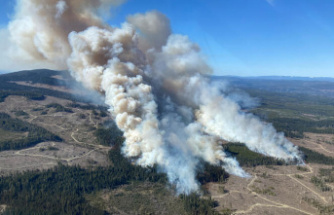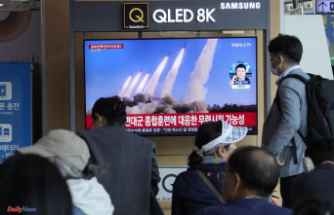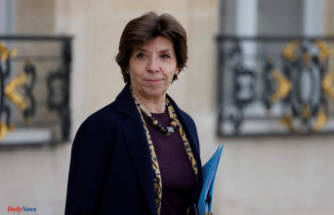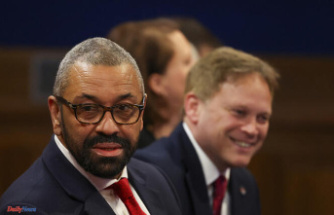Exhausted after almost two months of a route, a group of Central American migrants tries to reach Mexico City to star in an unpublished protest with which to demand the cessation of government persecution and the regularization of its permits. His arrival was scheduled for the past Friday, but the deployment of military on the roads has forced them to postpone his plans. Despite the difficulties, the organizers of the caravan promise to take their public denunciation to the same doors of the National Palace, home and office of President Andrés Manuel López Obrador, days after the country recorded his greatest migratory tragedy of recent years.
"This government is being worse with the migration that the previous ones, it has a nice discourse but its policies are terrible," says the Música Irineo world, the leader of the NGO 'villages without borders' and impeller of this caravan. Since the municipality of Río Cold, in the vicinity of Mexico City, Música and a group of 700 migrants, a figure that the authorities lower 387, rest before performing the umpteenth attempt to reach the capital, "We have several days trying to try to Arrive, but they are not leaving us, the National Guard prevents us from climbing up and moving in a group, "denounces.
The members of the caravan share their way with thousands of pilgrims who are directed to the Basilica of Guadalupe to honor the patron of Mexico. Before the pandemic, this festival brought together about 10 million parishioners, but this time the sanitary restrictions are going to prevent such figures from reaching. Migrants wanted to stay overnight in the Basilica, but finally they have discarded it: "It's not a good day to go and also the authorities were not going to let us go. At the socket, we will go, that I can guarantee it," Música says.
The fateful accident that left 55 migrants killed in Chiapas, fell like a jug of cold water among the members of the caravan. According to Mújica, "many had relatives or acquaintances who traveled in that truck." Despite the obvious risk involved in traveling under these conditions, the leader of 'villages without borders' does not believe that things will change: "There is no other alternative." Last Friday, a truck from the National Migration Institute (INM) ran over two members of the caravan on a road from Puebla. For Música, who knew wounded migrants, this incident returns again the consequences of Mexico's militarization: "Thank God nobody died, but this is the reality of the INM, a corrupt organism that seeks to criminalize those who migrate."
Faced with the imminent arrival of the caravan, the capital authorities have announced the opening of a temporary hostel in the Mayor of Iztapalapa with capacity for a thousand people. It is not yet clear if migrants will accept offering, since many fear being detained. The region lives an unprecedented migratory wave, a Diaspora of Central Americans who confirm the figures thrown by the migratory agencies of Mexico and the US. The militarization of the territory has pushed many migrants, such as the 55 victims of Chiapas, to assume more risks and travel into trucks. The driver who provoked the accident continues at the unknown whereabouts, but researchers already know that he belongs to a criminal group dedicated to trafficking.
Despite the evidence, the Mexican government denies that the deployment of the National Guard or the reactivation of the 'Stay in Mexico' program, have had a negative impact on the conditions of the migratory route. Faced with this unprecedented crisis, López Obrador is committed to two ways: the creation of development aid programs in countries that originate migration and a frontal combat against migrant trafficking mafias. This was confirmed by the Chancellor Marcelo Ebrard, after meeting with representatives of the governments of Honduras and Guatemala, "we are going to create an immediate action group against the network of traffickers of people."
Date Of Update: 12 December 2021, 20:19











